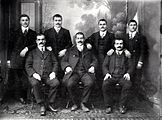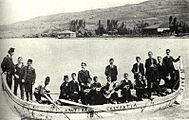Pontic Greeks
The Pontic Greeks (Pontic: Ρωμαίοι, Ρωμιοί;[3][4][5][6][7] Turkish: Pontus Rumları or Karadeniz Rumları; Greek: Πόντιοι, romanized: Póndii or Ελληνοπόντιοι, romanized: Ellinopóndii; Georgian: პონტოელი ბერძნები, romanized: P'ont'oeli Berdznebi), also Pontian Greeks or simply Pontians, are an ethnically Greek[8][9] group indigenous to the region of Pontus, in northeastern Anatolia (in Turkey). Many later migrated in various waves between the Ottoman conquest of the Empire of Trebizond in 1461 and the Russo-Turkish War of 1828–1829. Common migratory destinations included other parts of Eastern Anatolia, the former Russian province of Kars Oblast in the Transcaucasus, and the country of Georgia.
This article is about the ethnic group. For their native language, see Pontic Greek.
Those from southern Russia, Ukraine, and Crimea are often referred to as "Northern Pontic [Greeks]", in contrast to those from "South Pontus", which strictly speaking is Pontus proper. Those from Georgia, northeastern Anatolia, and the former Russian Caucasus are in contemporary Greek academic circles often referred to as "Eastern Pontic [Greeks]" or Caucasian Greeks. The Turkic-speaking Urums are included in this latter groups as well.
Pontic Greeks traditionally speak Pontic Greek, which speakers call Romeika. This is a distinct form of the standard Greek language; its unique linguistic evolution was due to the remoteness of Pontus from the rest of the Greek-speaking world.
The Pontic Greeks had a continuous presence in the region of Pontus (modern-day northeastern Turkey), Georgia, and Eastern Anatolia from at least 700 BC until the Greek genocide and the population exchange with Turkey in 1923.[10] They owe their ancestry to multiple different sources, detailed in "Origins" below.[11][12] Today, most Pontic Greeks live in Greece, especially in and around Thessaloniki in Greek Macedonia.
Origins and genetics[edit]
Pontic Greeks are an ethnic Greek subgroup, indigenous to the region of Pontus, in northeastern Anatolia.[22][23][24][25][26] Greeks lived in Pontus since "the time of the Argonauts, Herodotus and Xenophon and the Ten Thousand".[27] The Pontic Greeks are believed to be descendants of ancient Greeks who in the 8th century BC had moved from the Ionian cities located in the islands and shores of the Aegean Sea, to the area of the Black Sea called Pontus.[28][29] However, as many different ethnic groups have lived in the region since ancient times and have intermarried, today's Pontic Greeks likely also owe their ancestry to ancient Anatolians,[30] other Greeks, other migrants to the Pontos,[31] Caucasian peoples (such as Hellenized Lazes and Armenians),[32][33] and Turks.[12]
Pontic Greeks are genetically similar to other groups living in the Caucasus. A genetic study of male Georgians, including Pontic Greeks in Georgia, revealed that the latter had high incidence of haplogroup L, which is also prevalent among Laz people. Haplogroup G2 and haplogroup J2 were also prevalent among the Pontians studied.[34] Pontians in Georgia and Lazes are genetically similar. Armenians in Georgia and Pontians in Georgia are also genetically similar.[35] In addition, the Pontians studied were genetically diverse, indicating genetic mixture with other groups.[36] The region of Pontus has been diverse since at least the Middle Ages; in 1204, the Matzouka (Maçka) region alone contained Greeks, Italians, Lazes and a few Armenians.[37]
Self-identification[edit]
In the 21st century, most Pontians strongly identify as Greeks.[38] However, this has not always been the case. Before the creation of the diaspora, many Pontians did not consider themselves Greek.[5][6][39]
An ethnicity is made up of people with ancestry or cultural background in common.[40] Self-identification is an important part of belonging to an ethnic group.[41] Pontians have a lot in common with other Greeks; for example, they speak Romeika, a Greek language variety. Pontians also traditionally follow the Greek Orthodox faith, although a minority in Turkey are Sunni Muslims. Pontian Greeks also share traits with other ethnic groups. Like Turks, they cook havítz (kuymak), boortsog, and İmam bayıldı. They share other aspects of their culture with Lazes, Persians, and Armenians. They may owe some aspects of their culture to ancient Anatolian peoples.[33]
Pontian self-identification is also important. The Pontic label is relatively new. Anton Popov writes, "Anthony Bryer states that 'at the beginning of the nineteenth century a Pontic Christian might describe himself in the old way as a Douberites, Phytanos or Tsitenos first, and then as a "Roman" (Rum) Orthodox subject of the sultan; by the end of the century he was calling himself a Greek, and after he had finally left the Pontos in 1923, a Pontic Greek.'" Anton Popov studied Caucasus Greeks in former Soviet territories. Most of the Romeika speakers that Popov interviewed referred to themselves as "Romei." He also mentioned that many Caucasus Greeks only began referring to themselves as Pontians when they went to work in Greece.[6]
During Ottoman times, most Pontian Greeks did not see themselves as "Greeks" per se. Neal Acherson, in his book Black Sea, writes, "Who did they think they were, in this pre-nationalist age? In the first place, they did not think of themselves as 'Greek' or as a people in some way rooted in the peninsula and islands we now call 'Greece.' Sophisticates in Trebizond might address one another in the fifteenth century as 'Hellenes,' but this was a cultural fancy rather than an ethnic description. Outsiders, whether Turks or northern Europeans, referred to them and to all the inhabitants of the Byzantine Empire as 'Rom' or 'Rum' people, or as 'Romanians' [Romans] — citizens of the Roman Empire, in other words, who were also distinguished by their Orthodox Christian faith. Struggling with these categories, a Pontic Turk whose village had once been Greek told Anthony Bryer: 'This is Roman (Rum) country; they spoke Christian here ...'"[5] This identification mirrored the identification of other non-intellectual Greeks at the time.
Greek nationalism only began to spread to the Pontos in the 1800s after the Greek nation gained independence from the Ottoman Empire. This nationalism came during a time of commercial prosperity in the Pontos. Again, Acherson writes, "The teachers and the school curricula came from Athens, bringing with them a new concept of Greekness which linked the Greek-Orthodox communities of the Black Sea and the 'nation' of Greece." He goes on to explain how the Greek government encouraged nationalist thinking: "A speaker in the Greek parliament in 1844 expounded this newly designed identity: 'The Kingdom of Greece is not Greece. It constitutes only one part, the smallest and the poorest. A Greek is not only a man who lives within the Kingdom, but also one who lives in Yoannina, Serrai, Adrianople, Constantinople, Smyrna, Trebizond, Crete and in any land associated with Greek history and the Greek race."[42] The newly established Kingdom of Greece set up consulates in the Ottoman Empire to spread the Megali Idea. While the Anatolians recognized a shared cultural heritage, most weren't involved in an irredentist movement.
Few Pontic Greeks supported the Megali Idea except for some Greek nationalists such as Nikos Kapetanidis. Very few wanted an independent Pontic state, and few had ambition to join with Greece, even in the early 1900s.[27][43] The reason for this is unclear. Benny Morris and Dror Ze'evi give three theories on why most Pontic Greeks distanced themselves from nationalism and separatism: poorly developed political consciousness, tradition of submissiveness to Islamic hegemony, or fears of massacres and economic harm.[43] More generally, Greek nationalism in Asia Minor mostly appealed to "the most enlightened and liberal", to the medical, legal and literary professionals and to the rising middle class. It was opposed, however, by the "ancient [Greek] nobility, the superior clergy, the lay dignitaries of the church and the wealthy merchants".[27] There are also some Turkish-speaking Pontic Greeks, living in the Greek region of Western Macedonia, specifically in Metamorfosi, Kozani.[44] These Pontians follow the Greek Orthodox Church and profess a strong Greek identity. After the Greek-Turkish population exchange in 1923, even though the state never considered them a "national threat", many of these Pontians saw their language as a "cultural flaw" and desired to get rid of it. Historian and psychologist Stavros Iason Gavriilidis states that this was a result of the trauma they faced from the Greek genocide.[44]
Eastern Anatolia Greeks[edit]
Ethnic Greeks indigenous to the high plateau of Eastern Anatolia to the immediate south of the boundaries of the Empire of Trebizond – essentially the northern portion of the former Ottoman Vilayet of Erzurum between Erzinjan and Kars province, that is the western half of the Armenian Highlands – are sometimes differentiated from both Pontic Greeks proper and Caucasian Greeks.[130] These Greeks pre-date the refugees and migrants who left their homelands in the Pontic Alps and moved onto the Eastern Anatolian plateau after the fall of the Empire of Trebizond in 1461. They were mainly the descendants of Greek farmers, soldiers, state officials and traders, who settled in Erzurum province in the late Roman and Byzantine Empire period.
Unlike the thoroughly Hellenized areas of the western and central Black Sea coast and the Pontic Alps, the Erzinjan and Erzerum regions were primarily Turkish- and Armenian-speaking, with Greeks forming only a small minority of the population.[131] The Greeks of this region were consequently more exposed to Turkish and Armenian cultural influences than those of Pontus proper, and also more likely to have a strong command of the Turkish language, particular since the areas they inhabited had also been part of the Seljuk Sultanate of Rum and other pre-Ottoman Turkish powers in Central and Eastern Anatolia.[132] Many are also known to have "turned Turk" in both the Seljuk and Ottoman periods, and consequently to have assimilated into Turkish society or reverted to Christian Orthodoxy in the 19th century. Erzurum province was invaded and occupied by the Russian Empire several times in the 19th and early 20th centuries, and large numbers of Eastern Anatolia Greeks are known to have collaborated with the Russians in these campaigns, particularly that of the 1828–29 Russo-Turkish War, alongside Pontic Greeks inhabiting areas to the immediate north of Erzinjan and Erzurum.
As with Pontic Greeks proper, those Eastern Anatolia Greeks who migrated eastwards into Kars province, Georgia, Armenia and Southern Russia between the early Ottoman period and 1829 generally assimilated into the branch of Pontic Greeks usually called Caucasian Greeks.[133] Those who remained and retained their Greek identity into the early 20th century were either deported to the Kingdom of Greece as part of the exchange of populations between Greece and Turkey in 1923-4 or massacred in the Greek genocide that occurred after the larger Armenian genocide in the same part of Anatolia.[134]
![]() Media related to Pontic Greeks at Wikimedia Commons
Media related to Pontic Greeks at Wikimedia Commons













